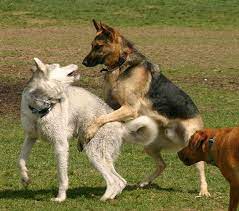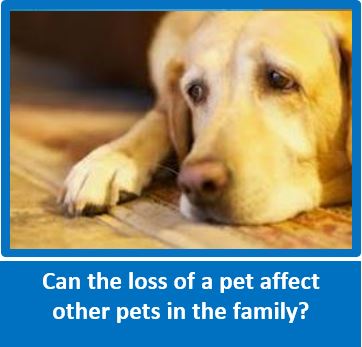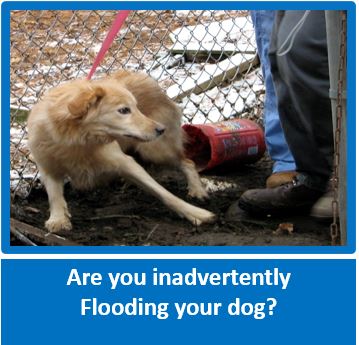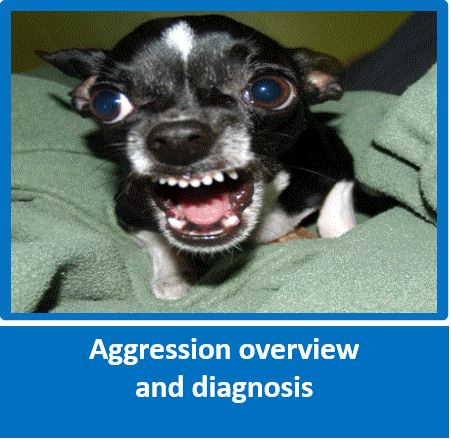
Why you should NOT take your puppy or adolescent dog to a dog park
by Mim Coward - Problem Solved Training
We came across this excellent post on Facebook
by Mim Coward - Problem Solved Training
We came across this excellent post on Facebook

If you have a new puppy, or active teenage dog you may consider bringing them to play at the dog park....after all, it seems like a good idea, doesn't it? A safe, off-leash space to let your puppy or teen meet and play with other dogs, a great way to make friends, and a good tool for socialization...right?
Except, unfortunately while many people make those same assumptions, it is often not the case, and dog parks can actually be VERY dangerous places for puppies and teens to play.
Why is that?
You never know what types of dogs you will run into at the dog park, and puppies and teenagers are particularly sensitive to traumatic incidents. Running into other dogs who might have poor social skills, be rude or pushy, scare the puppy or teen or worse case behave aggressively or trigger a dog fight can be extremely damaging to the evolving social skills of these young dogs. Every negative experience your puppy or teen has at the dog park makes them more and more likely to develop issues with dogs in the future such as fear aggression. Negative experiences DON'T have to be dog fights either, even mildly unpleasant experiences, over time, can do a lot of harm to a sensitive young dog.
For many dogs, large group play is extremely overwhelming and can be very scary, especially younger puppies and teens! And on top of that, many owners who bring their dogs to the park cannot control their dogs, and if fights or bullyish behaviors occur they are often unable to stop their dogs inappropriate behavior.
Puppies and teens who SEEM to take this all in stride and actually do enjoy playing with other dogs at the park aren't immune from negative side effects either - the artificial nature of the dog park dynamic, large group numbers and high level of arousal leads to dogs practicing extremely over the top, rough, high-arousal play. Too much exposure to this type of play and your developing pups will start to treat ALL playmates in this manner, rushing up to EVERY dog they see and LEAPING on them - expecting their advances to be received favorably like it is at the park - unfortunately for your dog however, this type of play style and greeting is NOT well-received by most other dogs, and these dogs often find it hard to make friends, or end up in dog fights when their over the top behavior is corrected.
While there are certainly SOME dogs who do well at the dog park, when it comes to puppies and teens it is better to avoid these trigger happy environments, because the risk is just too great.
So how DO you properly socialize your young dog?
Socialization with other dogs should achieved by having repeated interactions with safe, well mannered dogs - NOT about playing wildly and out of control with a large number of random dogs. Small groups and 1:1 play allow dogs to develop appropriate social skills, good play styles, and important conflict resolution skills!
Except, unfortunately while many people make those same assumptions, it is often not the case, and dog parks can actually be VERY dangerous places for puppies and teens to play.
Why is that?
You never know what types of dogs you will run into at the dog park, and puppies and teenagers are particularly sensitive to traumatic incidents. Running into other dogs who might have poor social skills, be rude or pushy, scare the puppy or teen or worse case behave aggressively or trigger a dog fight can be extremely damaging to the evolving social skills of these young dogs. Every negative experience your puppy or teen has at the dog park makes them more and more likely to develop issues with dogs in the future such as fear aggression. Negative experiences DON'T have to be dog fights either, even mildly unpleasant experiences, over time, can do a lot of harm to a sensitive young dog.
For many dogs, large group play is extremely overwhelming and can be very scary, especially younger puppies and teens! And on top of that, many owners who bring their dogs to the park cannot control their dogs, and if fights or bullyish behaviors occur they are often unable to stop their dogs inappropriate behavior.
Puppies and teens who SEEM to take this all in stride and actually do enjoy playing with other dogs at the park aren't immune from negative side effects either - the artificial nature of the dog park dynamic, large group numbers and high level of arousal leads to dogs practicing extremely over the top, rough, high-arousal play. Too much exposure to this type of play and your developing pups will start to treat ALL playmates in this manner, rushing up to EVERY dog they see and LEAPING on them - expecting their advances to be received favorably like it is at the park - unfortunately for your dog however, this type of play style and greeting is NOT well-received by most other dogs, and these dogs often find it hard to make friends, or end up in dog fights when their over the top behavior is corrected.
While there are certainly SOME dogs who do well at the dog park, when it comes to puppies and teens it is better to avoid these trigger happy environments, because the risk is just too great.
So how DO you properly socialize your young dog?
- Join a puppy play group or puppy class. It is MUCH better for puppies to play with OTHER puppies, not older teens or adults
- Set up "play dates" to your pup with 1-2 other dogs who have appropriate play styles and good manners.
- Smaller play groups allow for more control and oversight from the owners, who can observe their puppies and interrupt rude dogs, provide breaks to control arousal and help shape good social skills.
- Find friends to take dog walks with, walking in the woods with 1-2 other dogs can be a great way to provide ample time to socialize in a less stressful environment.
- Take a basic class, and swap phone numbers with other puppy owners whos dogs might be a good friend match for yours!
- Educate yourself! Take time to review resources that demonstrate how to identify GOOD dog to dog play, learn what red flags to look like, and how and when to intervene, allowing you to play an active role in shaping your puppies dog to dog experiences!
Socialization with other dogs should achieved by having repeated interactions with safe, well mannered dogs - NOT about playing wildly and out of control with a large number of random dogs. Small groups and 1:1 play allow dogs to develop appropriate social skills, good play styles, and important conflict resolution skills!




